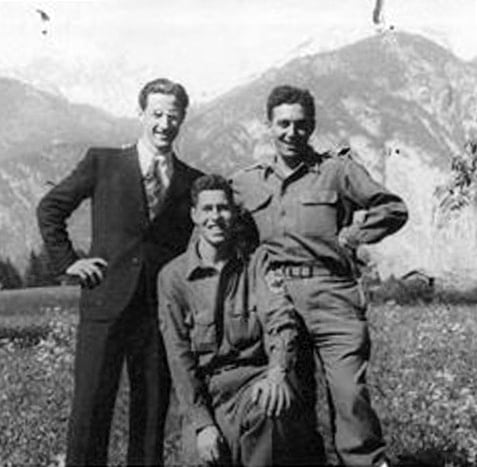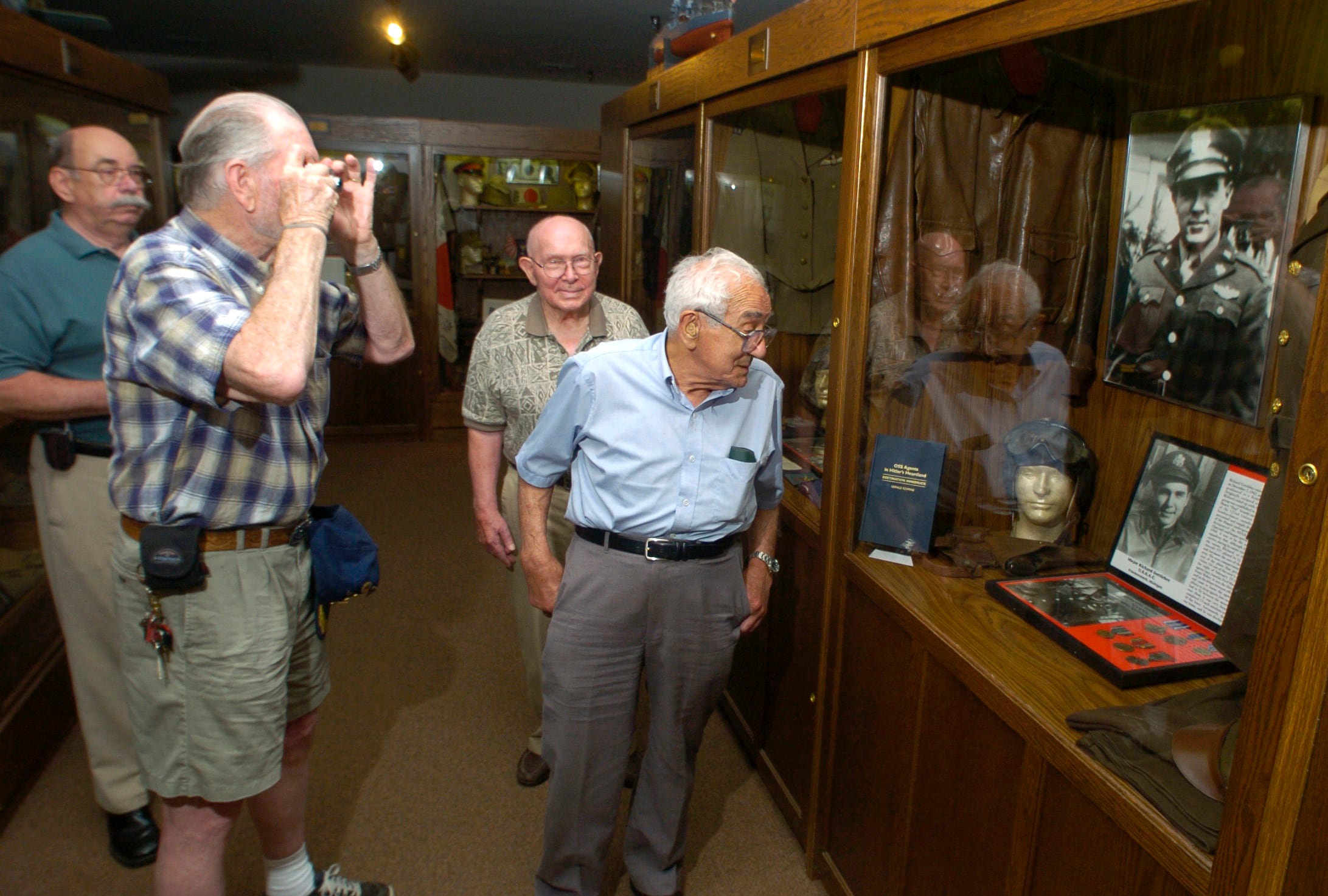Frederick Mayer, the real "Inglorious Bastard" who served in World War II, has died. He was 94.
Mayer, a Jewish refugee from Germany and a naturalized U.S. citizen, was recruited by the Office of Strategic Services, the World War II predecessor to the CIA. He then volunteered to lead Operation Greenup, one of the most daring and successful missions behind German lines.
Mayer's actions were portrayed in the award-winning documentary "The Real Inglorious Bastards," and in Patrick O'Donnell's book, "They Dared Return: The True Story of Jewish Spies Behind the Lines in Nazi Germany."
Mayer, "beloved father, companion, uncle, neighbor, friend and bridge partner, died peacefully in his own bed with family at his side at 4 a.m." Friday, his daughter Claudette Mayer wrote in an e-mail.
"At 94, Fred had stayed fully engaged mentally and physically until very recently," Claudette Mayer wrote.

Frederick Meyer (far right) served as a Jewish spy behind enemy lines in Nazi Germany.
Photo Credit: DoD
The OSS Society, a nonprofit organization that celebrates the accomplishments of the Office of Strategic Services during World War II, mourned Fred Mayer's passing.
"When OSS founder Gen. William Donovan said that OSS personnel 'performed some of the bravest acts of the war,' he must have had Fred Mayer in mind," said Charles Pinck, president of the OSS Society.
The society also continues to push for Fred Mayer to receive the Medal of Honor, the nation's highest award for valor, for his actions during World War II.
Mayer was first nominated for the Medal of Honor on Sept. 17, 1945, for knowingly and willingly risking his life almost daily to gather "secret intelligence of great value to the United States," according to the OSS Society.
The War Department rejected the nomination, recommending him for the Legion of Merit instead. His commander then asked the Army to submit a new recommendation for the nation's top award or for the Distinguished Service Cross, but this request also was rejected, according to the OSS Society.
"For his bravery during World War II, Mayer was nominated for the Medal of Honor. He never received it," Pinck said. "When the White House presented the Medal of Honor in 2014 to 24 veterans who did not receive it because of discrimination, Fred Mayer, a Jewish refugee from Germany, should have been included in this group."
On March 18, 2014, 24 soldiers were awarded the Medal of Honor — 21 of them posthumously — for their actions during World War II, Vietnam or Korea. The men, dubbed the Valor 24, were recognized after a sweeping review to ensure those who deserved the Medal of Honor were not overlooked because of their race or ethnicity.
On the eve of the White House ceremony, the OSS Society sent a letter to then-Army Secretary John McHugh, urging him to take another look at Fred Mayer's case.

World War II veterans John Billings, 82, of Woodstock, Va, second from left, then left to right Richard Gottleber, 85, of Frankenmuth, Mich., center, and Frederick Mayer, 84, of Charles Town, W. Va., right inspect Gottleber's display at Michigan's Own Military and Space Museum in Frankenmuth, Mich., June 27, 2006. Stan Bozich, of the museum is at left. The men talked about their time together during WWII when Billings flew a B-24 and Gottleber served as the bombardier. They dropped Mayer into Nazi-controlled Austria in 1945 to spy for the United States. (AP Photo/The Saginaw News, David A Sommers)
Photo Credit: DAVID A. SOMMERS, AP
Fred Mayer, when reached by Army Times, said the OSS Society contacted him about their efforts.
"They told me they're not giving up," he said at the time. "I appreciate that, but it's been turned down twice. I don't expect anything to happen."
The soft-spoken man also said he was not motivated by medals or awards.
"I did my job, and that's all that really mattered," he said. "I didn't do it to get a medal, that's for sure."
Fred Mayer was born in Freiburg, Germany, on Oct. 28, 1921, according to his daughter. He and his family moved to Brooklyn, New York, in 1938 to escape the Nazis.
Trained as a mechanic, Fred Mayer enlisted in the Army after the bombing of Pearl Harbor. He went on to lead Operation Greenup, which some have said helped shorten the war by six months and saved the Austrian city of Innsbruck from destruction, according to Claudette Mayer.
Fred Mayer and his comrades parachuted into Austria in 1945 and spent months organizing elements of the anti-Nazi resistance, collecting vital intelligence about German troop movements, spying on war factories and infrastructure, and tracking the whereabouts of Mussolini and Hitler, according to an account on the website of then-West Virginia Sen. Jay Rockefeller, who before he retired wrote to President Obama urging him to recognize Fred Mayer's actions.
In the two months he spent behind enemy lines, Fred Mayer often dressed in a German officer's uniform.
Intelligence collected by Fred Mayer allowed the Army Air Corps to bomb 26 Nazi military trains, blocking the Brenner Pass, a key passage used by the German military to move supplies across the Alps and throughout Nazi-occupied Europe to the war front, according to Rockefeller's former website.
He eventually was captured by the Gestapo and tortured for three days, but he refused to give them any information.
While in German hands, Fred Mayer actually convinced a top Nazi to surrender Innsbruck, Austria, and all German forces in the area. He then met the advancing U.S. Army, crossing German and American lines in a combat zone at great risk to himself, to inform the Americans of the surrender. Fred Mayer's actions are credited with saving "countless lives" on both sides, according to the OSS Society.
West Virginia Sen. Joe Manchin called Fred Mayer "a true American hero and an emblem of courage."
"While deployed, he posed as a German officer behind enemy lines," Manchin said in a statement. "When he was later captured, he exemplified what it is to be a true American hero. Mr. Mayer refused to give up sensitive information and instead convinced his captors to arrange a meeting with senior Nazi leaders. The subsequent meeting led to the surrender of a key Austrian post. His valor is an example to all who serve."
After the war, Fred Mayer served as a power plant supervisor until his retirement in 1977, according to his daughter. He settled in Charles Town, West Virginia, and was a volunteer driver for Meals on Wheels for 38 years, right up until three weeks before his death.
"He told us he felt lucky to have lived this long and happy life," Claudette Mayer wrote. "Although he sought no additional recognition for his wartime service, he and his family were thankful to all those who told his story and helped to memorialize his daring, courage and strength. Everyone who knew him appreciated his positive can-do attitude, his kindness and generosity, as well as his cooking and baking. Fred's good humor shone through the twinkle in his eyes."
Fred Mayer directed there be no funeral, his daughter said. He donated his body to medical research at the West Virginia School of Medicine.
He is survived by his life-partner Virginia Nash, his daughters Claudette and Irene, his grandson Shane, his sister Rush, and many nieces, nephews and cousins.
Michelle Tan is the editor of Army Times and Air Force Times. She has covered the military for Military Times since 2005, and has embedded with U.S. troops in Iraq, Afghanistan, Kuwait, Haiti, Gabon and the Horn of Africa.




